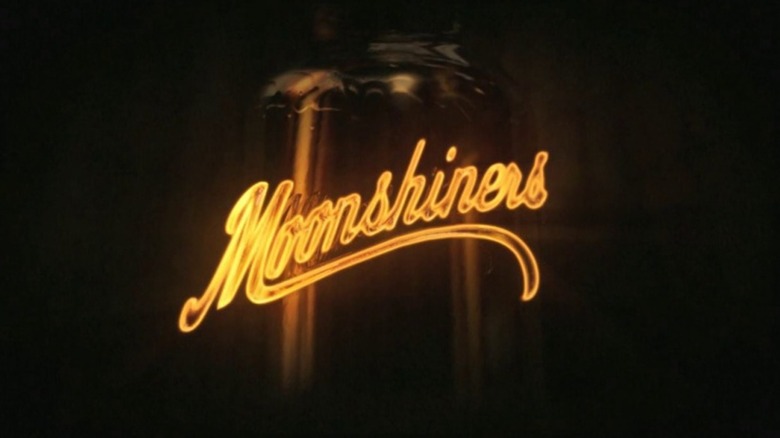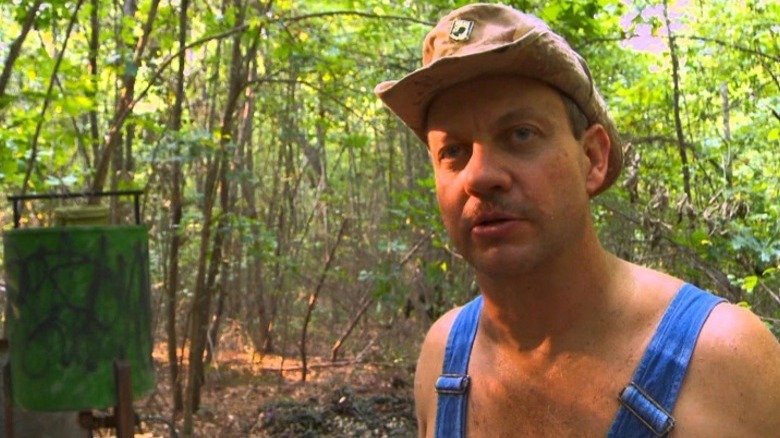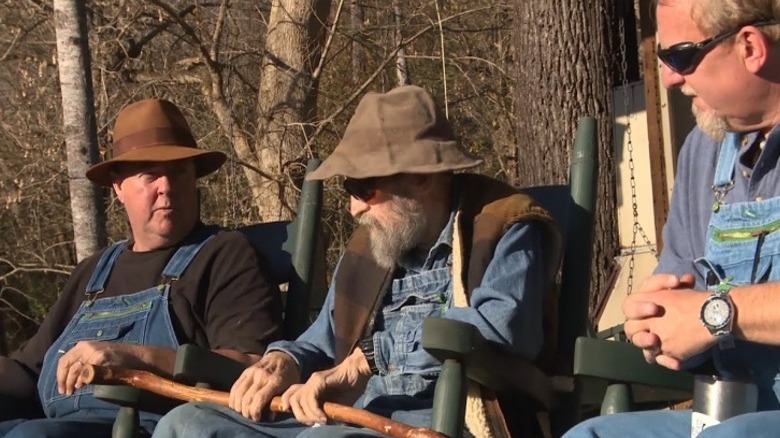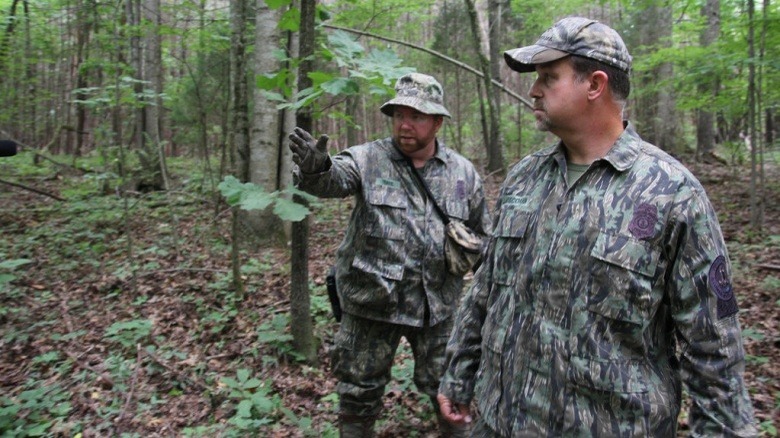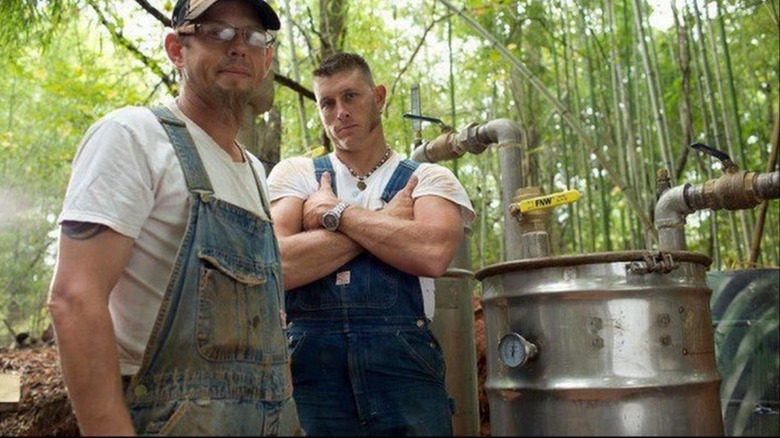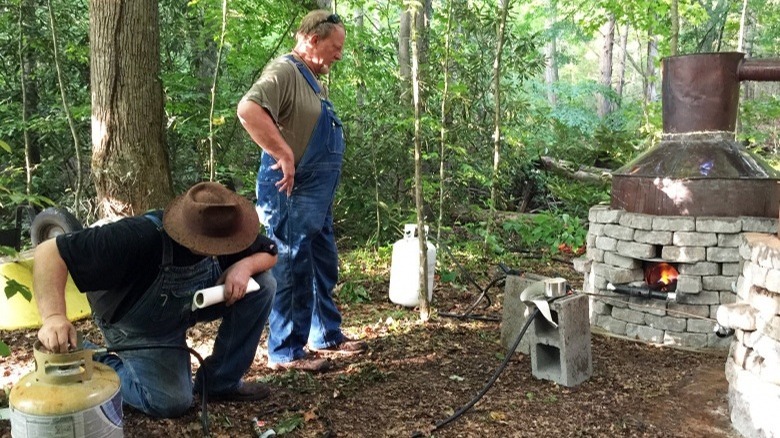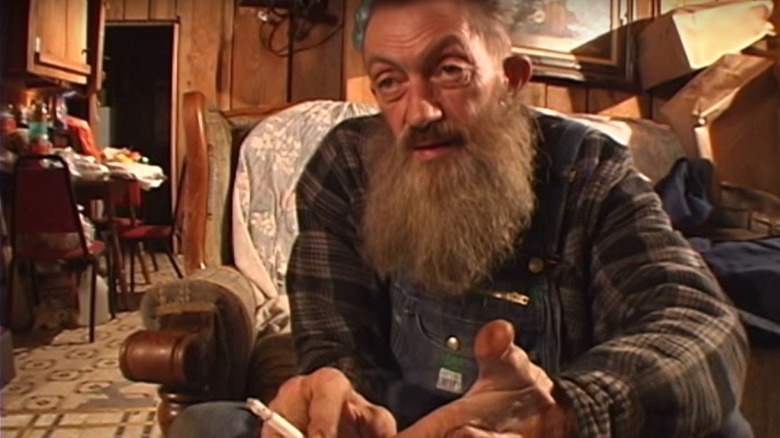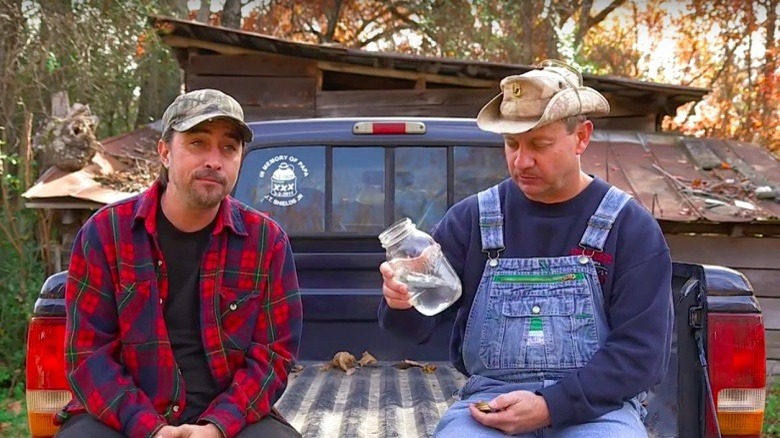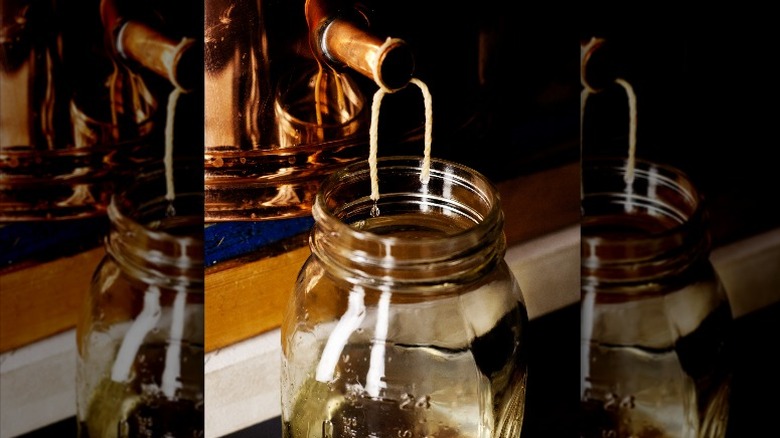Reasons Why Moonshiners Is Totally Fake
It's no secret that reality shows can sometimes deliberately deceive their audience. For example, in episode 142 of "Keeping Up With the Kardashians," Khloe Kardashian says that she's never been to Montana, even though the scene was filmed two days after her trip to Montana. And there have been plenty of other shows taken to task for being fake, like A&E's "Storage Wars" and History Channel's "Mountain Men."
One of the worst offenders may be the Discovery Channel hit "Moonshiners," which has been accused of faking its entire premise. Here's why that's almost certainly true.
The cops say nothing illegal is happening
Making moonshine remains illegal in the United States (federal law states you can produce beer and wine for private consumption without a permit, but not spirits). So how can the stars of "Moonshiners' break the law on national TV and stay out of jail? Well, according to local law enforcement, it's because "Moonshiners" is about as real as "Teen Wolf."
An exasperated Alcoholic Beverage Control spokeswoman informed the Associated Press (via Fox News) that the show only features dramatizations of moonshining, adding that "if illegal activity was actually taking place, the Virginia ABC Bureau of Law Enforcement would have taken action." Doubtless, the bureau will eventually take another look at the show, just as soon as they stop those pesky Duke boys from terrorizing Hazzard County.
It's made by a company that produces other misleading shows
"Moonshiners" is produced by reality TV behemoth Magilla Entertainment, which also makes shows like "America's Worst Tattoos," "Submissive Wives' Guide to Marriage," and "Militia Rising." Their finest work is unquestionably "King of Thrones," a show that can only be described as "'Pimp My Ride' for toilets."
Unfortunately, Magilla's shows have been repeatedly accused of misleading viewers. For example, an episode of "Lakefront Bargain Hunt" depicts an interior decorator named Robin Corbeil choosing between three different houses. In reality, Corbeil bought the "winning" home almost two years before the show taped. The same thing happens on "Beachfront Bargain Hunt," with the bonus that producers often temporarily decorate the houses before featuring them on the show. The show "Southie Rules" was widely panned for being obviously scripted, while the less said about "Long Island Medium," the better. In other words, Magilla may not be the gold standard for keeping the "reality" in reality TV, or even the cubic zirconium standard.
Jesse Tate was tricked into appearing on the show
The first season of "Moonshiners" featured special agent Jesse Tate of the Virginia Alcohol Beverage Control Bureau, although attentive viewers noted that he never interacted with the titular moonshiners, or gave any indication he was aware of that aspect of the show.
Sure enough, the furious bureau later claimed the producers had lied about the kind of program they were making. In a statement, the bureau insisted that it had "agreed to participate in an informative piece that documents the history of moonshine and moonshine investigations in Virginia. Virginia ABC did not participate nor was aware of the false depiction of moonshine manufacturing, distribution, and/or transportation in the filming, and would not have participated in the 'documentary' had it known of this portrayal" (via Today).
Jesse Tate, for reasons so obvious we'd be insulting your intelligence if we mentioned them here, did not reappear in season 2.
If it were real, the producers would be open to so many lawsuits
When it comes to depicting real crimes, reality show producers have to walk a fine line. Under U.S. law, witnesses to a crime aren't actually obligated to stop it from happening. For example, on A&E's reality show "Intervention," a camera crew followed a visibly intoxicated woman as she climbed into her car and tried to drive away. Even if she had hit someone, A&E wouldn't have been responsible, since its crew were merely observers and did not prompt the woman to drive drunk.
However, if a show deliberately puts people at risk, then it could be liable to legal action. One man settled out of court after he was hit in the face with a shoe during a fight on "The Real Housewives of New Jersey." His lawyer claimed that the fight was staged, and that the producers should have taken precautions to ensure bystanders weren't maimed by flying stilettos. "Big Brother" also had to settle a lawsuit after accepting a housemate with a history of assault, who proceeded to threaten another contestant at knifepoint.
Because the stars of "Moonshiners" are paid to appear on the show, the producers would almost certainly be liable if anyone was injured from drinking illegal alcohol produced for the show. Since sheer insurance costs haven't shut down production, it seems likely that no actual moonshine is being sold on the Discovery Channel's dime.
Everything on the show could easily BE legal
Although it's illegal to distill spirits in the U.S. without state and federal permits, it's not like those permits are impossible to get. With the publicity from the show, it would be super-easy for the show's stars to secure backing and go legit. This is exactly what cast member Tim Smith did, partnering with the Prost Beverage Company to market "Climax" brand moonshine in stores nationwide.
In other words, even if the show does feature real moonshining, it's not because the cast members are desperate criminals with no other options. They're just deliberately choosing not to get the correct permits for the sake of the show. Hopefully, more reality shows embrace this model, since "Extreme Makeover: Home Edition" would definitely be more interesting if all the work was done at night, with no planning permission.
Popcorn Sutton died before the show was filmed
The show does feature unquestionably real footage of moonshine being produced by legendary bootlegger "Popcorn" Sutton. However, this footage wasn't filmed for the show. In fact, Sutton sadly took his own life in 2009, two years before "Moonshiners" first aired. Before he died, he was the subject of the acclaimed documentary "This is the Last Dam Run of Likker I'll Ever Make" (later edited for TV as "The Last One"). The producers merely bought the rights to the movie and used the footage in the first season of their show.
At the time of his death, Sutton was awaiting trial for illegally distilling spirits, a charge notably avoided by the other stars of the show, who we're told are doing the exact same thing, while millions watch.
Even the moonshiners admit it would be possible to fake
When asked how they get away with breaking the law on national TV, the stars of "Moonshiners" usually have a simple answer: Nobody can prove they're actually doing that. Tim Smith told BourbonBlog that it's not enough to see someone making something that looks like moonshine. Instead, "physical samples of the product you're producing have to be taken and analyzed." We'll volunteer for that job if no one else will.
Meanwhile, Josh Owens told Motorcycle USA that, "I'm not in jail because it's not evidence, for one, that I'm on TV making moonshine. And for two, I could be doing anything, it could be just water." Either way, Owens argues that the cops "got a lot bigger fish to fry than somebody just making a little bit of something to sip on when alcohol's in every store and every bar in the countryside," which does kind of undercut the show's "daring outlaws" premise.
The show was originally about legal moonshine
When Magilla Entertainment started working on the show in 2010, executives thought that focusing on illicit moonshiners would be legally risky, probably because it is. Instead, they planned to feature licensed moonshiners going legit. Unfortunately, that turned out to be insanely boring. As producer Matt Ostrom told author Jamie Joyce, "a legal distillery is not the most compelling thing. It's not like people on boats hunting alligators or fighting giant seas. It's literally: Water boils."
As a result, Magilla went back to the outlaw concept. Although the producers insist that the finished show does depict illegal moonshining, their legal worries presumably didn't just vanish, suggesting that the "criminal activity" might not be all that it appears. Ultimately, the doubt may be half the fun. Maybe it's real, and probably it's not — either way, it's definitely entertaining.
